“Juno” (2007) is a movie directed by Jason Reitman and written by Diablo Cody, who won an Oscar for “Best Original Screenplay”. Since its release “Juno” has been well loved both by critics as well as by audiences. “Juno” has been seen as a witty comedy with a great female lead. However, despite the universal love this film has received, I didn’t enjoy “Juno” at all while watching it. The movie just seemed repulsive and creepy, instead of being charmingly witty. In this post, I will explain why. As a warning, it should be pointed out that this post will include spoilers.
The films protagonist is the sixteen year old Juno (Ellen Page), who has become pregnant after having unprotected sex (of course) with her best friend, Paulie. She first decides to abort the child, only to reconsider this option and choose, instead, to give up the baby for adoption. After some searching, she finds the upscale yuppie couple Vanessa (Jennifer Garner) and Mark (Jason Bateman), to whom she decides to give the baby up to when the time comes. The viewers of this film follow of the life of the expecting Juno in High School and at home.
The troubling nature of “Juno” is not the idea and plot point of unplanned pregnancy or adoption, but rather how these subjects are depicted. On top of the problems with the portrayal of the unwanted pregnancy, Juno as a protagonist isn’t a particularly likeable character (or at least to me and my inclinations she is not). Juno’s normal operating social sense seems to hover in the area of the quintessentially arrogant and emotionally distant, and throughout the entirety of the film we witness Juno endlessly looking down upon everyone unlucky enough to find themselves in her proximity, hiding behind an irritating sarcastic attitude, and engaged in a unremitting (and supposedly) hipster banter. Amazingly Paulie, the best friend and coordinated parent, is the main focus of this bad behavior (a verbal abuse which persistently puts him down and always in the midst of the public gaze) and is in generally so poorly treated by Juno that the claim of a strong friendship between these two would seem to be more than highly improbable. A primary example is illustrated in a scene between these two where an argument is taking place and we find the always “funny” Juno loudly yelling out in the public arena of the High School (Gymnasium for the European readers): “I took your virginity!”. If “Juno” would have at any point been realistic, the film would have depicted the awful and large amount of bullying Paulie would have been subjected to after this dreadful and malicious outburst of Juno.
Before the above scene of this public humiliation and question of virginity, we find the socially questionable Juno insisting to the much put upon Paulie that he should begin to hang out with other girls, regardless for his attachment or fondness for them. Yet by the end of the film, we find the subtly (which those who use the verbal) abusive Juno suddenly declaring her love for Paulie and the two end up dating. Considering how Juno, nearly for the entire film, verbally ill-treated Paulie, it’s hard to believe that the two of them could ever become a happy, healthy couple.
Juno as a character is suppose to be comedic and funny, but not once did I laugh at her witticism and verbal play which, instead of enlightening and exploring, wallows in the realm of overt narcissism and oblivious snobbishness. In fact, Juno’s personality cannot help but remind the audience of the persona of the penultimate bully, which makes it impossible to sympathize with her as a leading character.
However, the movies major flaw is the outrageously backwards depiction of the environment and servers working within Women’s Health Care Clinic’s (Translation for the movie is: Abortion clinic). Juno, after learning she’s pregnant, heads off to get an abortion. When arriving at the clinic, she meets a classmate outside of the clinic protesting and chanting: “All babies want to be born!”. One can wonder if the writer purposefully gave the protesting girl a nonsensical slogan, due to the fact that abortions are performed on fetuses that haven’t yet developed self-consciousness and therefore cannot want anything. However the audience is actually expected to sympathize with the protesting girl, as it turns out when she tells Juno that her baby by now has developed “finger nails” in hopes of getting Juno to change her mind, a statement the film regards as words of wisdom. The information of the now existing fingernails does in fact make Juno reconsider her decision.
The way the movie “Juno” deals with anti-abortion protesters is, to say the least, simplistic and simple-minded. Having only one protestor at the clinic having a “peaceful” conversation with Juno is fairly far off of the actual practice of the anti abortion protesters who operate in the horrendous realm of heckling and harassing of the women who find themselves in need of the services of a abortion clinic. If the film would have bothered to be more realistic, Juno’s classmate would have been accompanied by an unseemly horde of hostile campaigners blaring: “Murderer! Murderer! You’re killing your baby!” while using physical proximity to intimidate the already emotionally frail seekers of the service.
When Juno gets into the clinic, she at once is handed papers to fill-out by the clinics clerk. At the same instance Juno is also handed a condom by the clerk, hoping to encourage the use of the condom (Juno is there for an unwanted pregnancy!), notes that the condom leaves a nice smell after sex, something the clerk indicates that she knows from using the same brand herself. On receiving the condom from the clerk Juno dons a look of disgust to her face, indicating that the audience is suppose to view the clerk woman as a bit unseemly, and definitely crossing some line of “good taste”, for handing this young girl, with the unwanted pregnancy, free birth control. While I’ll agree that the clerk perhaps made Juno uncomfortable by telling a little too much about her own intimate life, it’s still hard not to interpret the clerks actions as anything other than extraordinarily reasonable and even pedagogically correct (teaching often uses the personal to create bonds for learning). Since Juno has shown up to abort a child she does not want, the clerk can assume Juno doesn’t feel ready to be a parent yet wants to be sexually active, so she gives her a condom and tries to further encourage Juno to use it remarking on the condoms nice smell. The Clerk is fulfilling the mandate of all Women’s Health Centers and Abortion Clinics by informing women on the importance of Birth control in order to insure that women won’t have to be constantly facing the challenge of unwanted pregnancies. The films decision to depict the Clerk, and therefore everything about the abortion clinic, as out-of bounds, and even a bit disgusting, seem to paint the mandate of sexual education as moderately nasty and even disrespectful. As a result, Juno comes off as infantile while the clerk seems like someone trying to help and professionally working to ensure the moral mandates and proper educational operations of the Clinic.
The scene ends with Juno retreating from the clinic and deciding to give the child away instead of aborting it.
The worst part of this film is not, however, this bizarre depiction of the clinic, but the conversation Juno has with her female friend directly afterwards. Juno informs her friend how the clerk freaked her out by doing the horrible and unforgivable act of trying to inform her of birth control, highlighting how the clerk giving her a condom was too much for her to handle, on top of the whole situation being wholly uncomfortable for the sadly put-upon Juno (at this point of the film, I felt really bad for the unfortunate clerk who had to put up with Juno for a few minutes – truly, the clerk is the tragic heroine of this film!). While the film tries to portray Juno as a smart young woman, the lines that Juno delivers just make her look like the stereotypically naïve and shallow “valley girl-type” going “eew, gross!” at everything around her instead of a smart responsible nerdy girl. Since the audience is supposed to sympathize with Juno, it is clear that the viewer, in some odd and backwards world of sympathy, is actually meant to concur that what happened in the abortion clinic as revolting and vulgar.
“Juno” could have worked as a film if the theme would have been about choice. Instead, the film very strongly demonizes the very idea of abortion and the act of providing young people with birth control and education, through the metaphor of the Clinic, by means of the actions of the films protagonist being fundamentally and childishly squeamish and ignorantly rejecting of information. The thing is that if you ridicule and portray some of the several options regarding an unwanted pregnancy (such as abortion) as perverse, than the film is no longer about choice, but propaganda for the anti-choice movement.
“Planned Parenthood” and abortion clinics provide an important service for women who feel like they aren’t ready to have children. Having abortion as an option for females everywhere is a right and gives women power over their bodies and lives. Since “Juno’s” depiction of the Women’s Health Clinic was so negative, the viewer can only assume that the film wants to send the message that when faced with unwanted pregnancy, one should automatically erase abortion as an option. As an added bonus, Juno’s disgust with getting a condom even makes it seem that the film finds the idea of being responsible with sex as a comical and “yucky” idea.
So how is one to enjoy the film “Juno”? As a movie tract promoting verbal bullying and devaluing sexual education (and control), whilst moving towards the creation of a morality play of anti-choice. And in the end what we are left with here is but a basic anti-feminist stance couched in the refinement of a young and hip female protagonist.
For another negative review of Juno, read Ezra Steads insightful article.














I too had a lot of issues with this film. I found Paulie’s story much more interesting because she told him she was going to terminate the pregnancy and then clearly doesn’t and never really talks to him about it. A good reminder to young men than you might not have a say in what happens when you accidentally get a girl pregnant, but I would love to have known what was going through his mind. However, I was think the abortion clinic scene was more a means to an end than any kind of statement. When you make a film about an unplanned pregnancy, you have to at least address abortion and the filmmaker needs Juno to not choose abortion.
I was disturbed by how “whatever” everyone was about Juno’s pregnancy. No one was allowed to make her feel uncomfortable about it and she is completely right regarding all her decisions. It also portrays adoption as this thing you do and then you move on with your life like it never happened, which is very misleading.
Also the script thought it was the coolest kid ever.
Yes, Paulie’s story did seem quite neglected by the film and he might have been a better protagonist for the film, which pains me to say since female-centric stories are important and too often ignored in cinema. But Paulie was mostly used as a obligatory father for the child and as a forced love interest. However I do remember Juno somewhat asking Pauli if he’s okay with the abortion – to which he just kind of doesn’t really give an answer, which Juno takes as a “yes”. I guess was a bit unsettling. But agreed, Paulie should have had a say in the adoption plan, which he never does.
Juno’s behavior towards Paulie was peculiar anyway – I never bought into their supposed friendship.
The problem with the abortion scene was not only how Juno reacted to the scene, but how the film portrayed the clinic itself: dirty, sleazy, with unengaged workers, and people scratching themselves constantly. Juno’s reaction also informed the viewer of what other vices the clinic has, such as being handed a condom and the other people in the clinic reading magazines she didn’t like (Juno being the judgmental person she is!). Naturally the film had to address the option of abortion, but how they chose to address the option was by making sure the audience feels repulsed by the option of abortion and gave a harmful, inaccurate image of Women’s Health Centers, like that their extremely dirty and trashy with obnoxious workers when in reality those clinics provide important services for a functional society. Otherwise I wouldn’t have had any problem with Juno deciding to keep the baby for adoption.
Yes, I was also confused how everyone was shown to be very calm and overly accepting about Juno’s pregnancy. I didn’t understand why her parents couldn’t give Juno a lecture in using protection? I think Juno did have a right to her decisions (even if she made them for stupid reasons) but the film refused to address the fact that Juno should have used protection. Especially the parents seem all to understanding without pinpointing to Juno what she could have done to prevent her situation. And while pregnant at High School, nobody is shown picking on her, which seemed unrealistic.
However, the adoption was maybe shown a little simplistically, but I was glad at least the film showed that decision as something to be taken seriously and to be respected. It is a good decision for some women, so. I was glad at least that option was not demonized by the film.
But yeah, the films portrayal of Juno as “the coolest kid ever” was really annoying. 🙂 Thanks for the comment!
I just am not sure Cody was trying to say anything political, etc about abortion, just needed Juno to not do it but did it in an irresponsible manner.
I’m a little obsessed with Teen Mom but watch mainly for the couple that chose adoption. It’s a very beautiful portrayal of what adoption can be, but it’s an emotional process and Juno did not respect that.
I’ve read that Ms. Cody and Mr. Reitman are supposedly pro-choice and did not want to politicize any option, but the way the movie portrayed the clinic was done in such a negative tone that it’s impossible not to see the film as a political statement.
Well, in the character Juno’s defense, I never felt that she emotionally invested in anything, besides (spoiler alert) when she supports Vanessa to adopt Juno’s child even if her husband changed his mind. So Juno was just a character who didn’t (in my opinion) ever really respected anything.
However, somethings may just be individual, in that the experience is different for different people.
I think you misinterpreted a lot of situations in this movie. Juno did not verbally abuse” bleaker. she got into an argument once. It is understandable that a hormonal, pregnant teenager behave a bit moody while she is in love with her best friend. Juno is a strange and definitely a flawed character, which is what makes her such a pure character. Her reaction to many situations is justifiable.
I have no problem with flawed characters, but my problem was that Juno acts arrogantly towards other constantly and belittles them. Yes, she and Bleaker were in a fight, but she screams about private things in their high school. She has no sense of the trouble it might cause, which fells selfish. Also, she makes fun of people all the time – at the women´s clinic she seems grossed out by all the people at the clinic simple because they aren´t traditionally attractive. True, teenagers are fairly hormonal and Juno is pregnant, but neither one aspect exuses the public humiliation of Bleaker. Juno just came off as fairly egotistic to me, that’s all.
Thanks for commenting!
I agree with you that this movie is worthy of florid indignation. So much that the actors and creators should have their careers tarnished for good. I also agree with your assertion of Juno’s detestable and tomboy character. However, I am not convinced of your assertion how the nature of an Abortion clinic should be depicted. All clinics serve similar services and functions, but not every nuance, personal situation or drama unfolding at these clinics is the same even if how it is portrayed in this movie doesn’t jive with your vision of how they are.
I didn´t protest so much Juno´s tomboy persona, I was more protesting her more bully-like persona which is a little different. I´m sure that not all personal at clinics are perfect, but it´s a bit troubleing that the film kind of unneccesarely exaggerated and even somewhat twisted certain things like that the personal did – like when the woman gives Juno a condom; instead of just having her give the condom they made it into “the personal is a creep and pervert while giving the condom”. It´s exaggerated and unrealistic